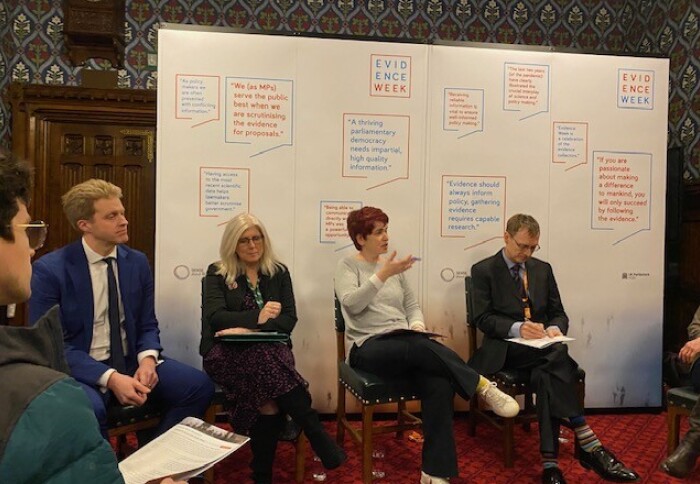Imperial experts showcase AI leadership in Parliament

Imperial College London partnered with the charity Sense About Science to participate in their annual Evidence Week series of events in Parliament.
Evidence Week is the flagship annual science engagement event of the charity Sense About Science. The week is built around a series of events designed to bridge the gap between scientific research, the policymaking process and the public, held in Westminster and online.
This year’s Evidence Week events featured Imperial’s AI expertise across two events held in Westminster.
Opening reception: AI and democracy
This year’s Opening Reception took place in the Jubilee Room of the Palace of Westminster, hosted by Lord Ravensdale and with a guest list drawn from both houses of parliament and a range of industry, policy and advocacy organisations.
The reception opened with a panel discussion focused on the impacts of AI on democracy and the role of Parliament, chaired by Sense About Science CEO Tracey Brown OBE.
Professor Mary Ryan, Vice-Provost (Research and Enterprise) at Imperial, addressed the fundamental need for trusted sources of information and expertise as advances in AI increase the risks of AI-enhanced disinformation and systemic bias in AI outcomes if models are trained on partial or biased data.
She also reflected that there is also a need for policymakers to access impartial advice from transparent sources, free from conflicts of commercial and political interest. Professor Ryan concluded that this is a role that research institutions like Imperial are capable of playing, in partnership with parliamentary information bodies like the Parliamentary Office of Science and Technology (POST) and the Libraries that support the work of the Commons and Lords.
Professor Ryan identified the Imperial Policy Forum’s training offer to civil servants as an example of a university playing a critical and constructive role in providing government and parliamentary staff with the specific knowledge and skills needed for their roles in AI policy.
The panel also featured Ed Humpherson, Director General for Regulation at the Office for Statistics Regulation. Ed pointed to the importance of transparency in tackling disinformation as a key challenge for parliament as AI makes it easier to disrupt democratic processes through, for example, the use of ‘deepfake’ images and video.
The panel was completed by Dr Allison Gardner MP, member of the Science, Innovation and Technology select committee, and Dr Ben Spencer MP, Shadow Minister for Science, Innovation and Technlogy. Both agreed on the scale of challenges and opportunities now facing parliaments around the world as the use of AI-enhanced technologies increases. Both also referred back to their previous experiences as medical researchers and practitioners to inform the discussion from both a technical and political perspective.
Exhibition: Revolutionising the fight against antimicrobial resistance
On Wednesday 22nd, Imperial joined a number of research institutions and charities to participate in Evidence Week’s annual parliamentary exhibition.
Imperial’s exhibition focused on the contributions of AI and innovative diagnostic technologies to combatting anti-microbial resistance (AMR). The exhibition was led by Dr Leonid Chindelevitch, Lecturer in Infectious Disease Epidemiology in the School of Public Health at Imperial.
Dr Chindelevitch also showcased a range of new diagnostic testing equipment that could quickly and reliably identify whether an infection was treatable by antibiotics.

Many antibiotics, in the UK and around the world, are prescribed for conditions that they cannot treat. This overuse of antibiotics is driving the evolution of organisms that are immune to antimicrobial treatments, directly contributing to more than a million deaths worldwide each year – a number that is projected to rapidly increase.
Dr Chindelevitch’s research explores the ways in which AI can make diagnosis faster and more accurate. He explained to parliamentarians the ways in which AI-enhanced diagnostic tools can make a substantial difference to inappropriate antibiotic prescription rates. Beyond the improvement in health outcomes, he emphasised that the development of innovative diagnostics at universities like Imperial are important for their UK IP and the export potential of UK-based MedTech companies selling this equipment to health systems around the world.
Discussions of AI and AMR in parliament have been made more timely by the development of Imperial’s Fleming Initiative. This major project involves the building of a new centre for the study of AMR and antibiotics use, which will be based near Paddington as part of Imperial’s West Tech Corridor.
The Fleming initiative, under the leadership of Professor Lord Ara Darzi, Co-Director of Imperial’s Institute of Global Health Innovation, will bring together scientists from a wide range of disciples, health practitioners, and patient and community groups, to keep antibiotics working for the next hundred years.

Both events worked as a showcase for Imperial’s research talent and cross-sector leadership on questions of technology, health and democracy that are vital to the UK’s future and the wider world.
Article text (excluding photos or graphics) © Imperial College London.
Photos and graphics subject to third party copyright used with permission or © Imperial College London.
Reporter
Craig Whittall
College Headquarters